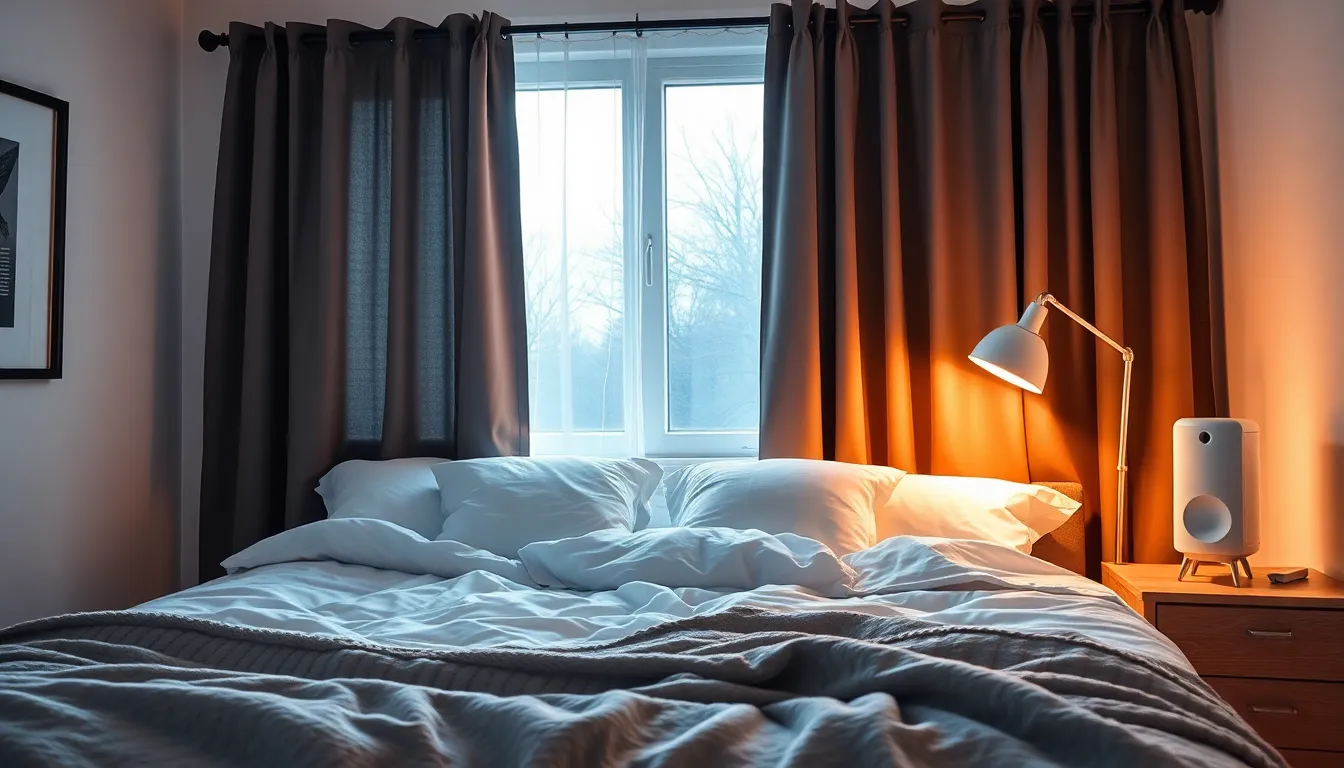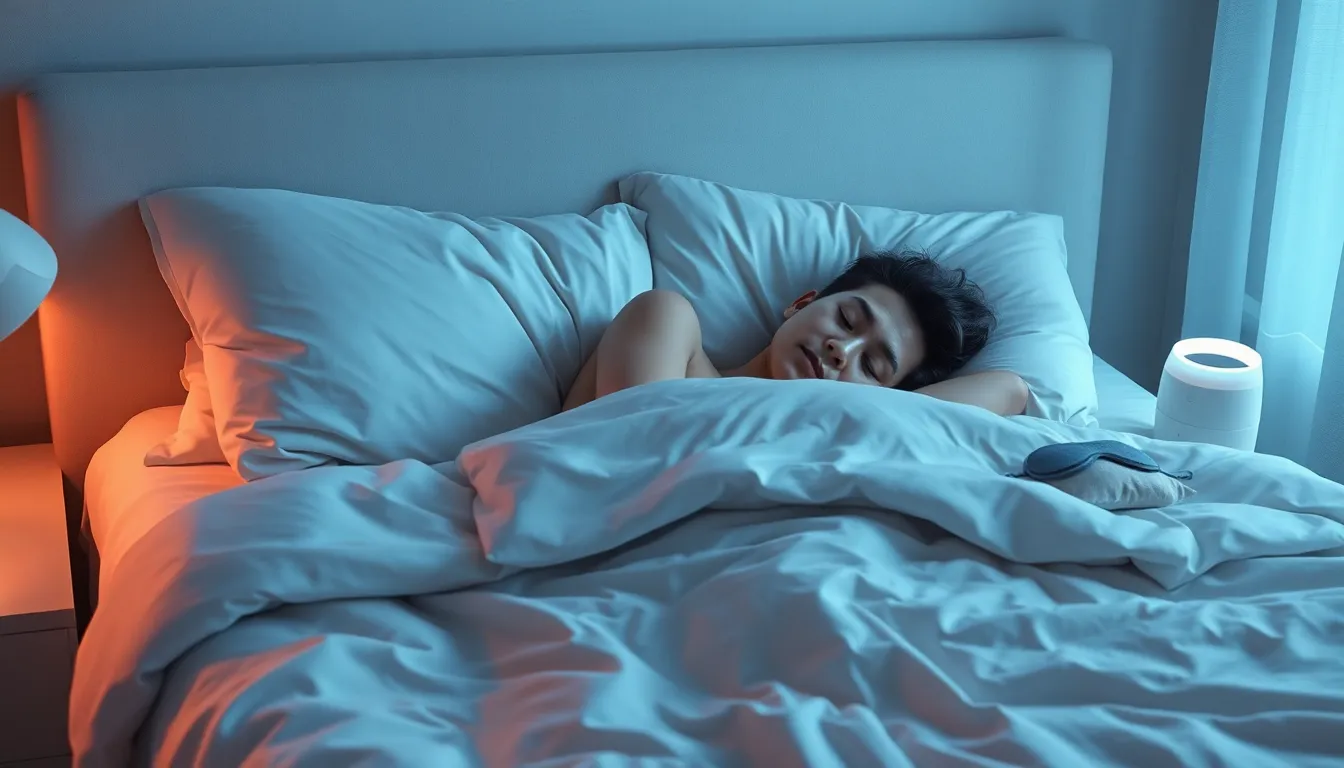Imagine sinking into your bed like a marshmallow in hot cocoa, blissfully unaware of the world outside. For many, achieving that deep sleep is a coveted dream—literally. In a world buzzing with distractions, mastering the art of deep sleep can feel like chasing a unicorn. But fear not! With a sprinkle of humor and a dash of practical tips, anyone can transform into a sleep champion.
Table of Contents
ToggleUnderstanding Deep Sleep
Deep sleep plays a vital role in overall health and well-being. This stage of sleep allows the body to rest and rejuvenate, offering numerous benefits essential for daily functioning.
What Is Deep Sleep?
Deep sleep, also known as slow-wave sleep, occurs during the NREM sleep cycle. This phase represents the most restorative period of sleep, with brainwaves slowing significantly. Individuals experience reduced heart rates and lower body temperatures. Disturbances during this stage can lead to feelings of grogginess, making it essential to achieve uninterrupted deep sleep for optimal health.
Benefits of Deep Sleep
Deep sleep provides numerous benefits crucial for both physical and mental health. Firstly, it aids in muscle repair and growth, promoting recovery after exercise. Additionally, this sleep stage enhances memory consolidation, allowing the brain to process information from the day. Hormonal regulation also occurs, as deep sleep supports the release of growth hormones. Overall, sufficient deep sleep improves mood and boosts cognitive function, making it vital for overall well-being.
Factors Affecting Sleep Quality

Multiple factors affect sleep quality, influencing deep sleep and overall restfulness. Both the sleep environment and lifestyle choices play significant roles.
Sleep Environment
A quiet, dark room promotes deeper sleep. Temperature between 60°F and 67°F creates an ideal atmosphere. Freeing the space from distractions, such as electronics, enhances relaxation. Comfortable bedding, including pillows and mattresses, supports restful sleep. Utilizing blackout curtains or eye masks blocks out light. A white noise machine or fan masks disruptive sounds, further aiding sleep.
Lifestyle Choices
Regular exercise promotes deeper sleep. Engaging in physical activity for at least 150 minutes weekly improves sleep quality. Consuming a balanced diet, rich in fruits, vegetables, and whole grains, supports overall health. Limiting caffeine and alcohol intake enhances the ability to fall asleep. Maintaining a consistent sleep schedule reinforces the body’s internal clock. Prioritizing relaxation techniques, such as meditation or reading before bed, fosters a calming routine.
Techniques to Promote Deep Sleep
Achieving deep sleep involves various techniques that enhance relaxation and comfort. Implementing these strategies can lead to more restful and rejuvenating nights.
Establishing a Sleep Routine
Consistency plays a key role in fostering deep sleep. Going to bed and waking up at the same time each day helps regulate the body’s internal clock. A pre-sleep ritual, such as reading or taking a warm bath, can signal the body that it’s time to wind down. Limiting exposure to screens 30 minutes before bedtime also promotes better sleep onset. Developing these habits reinforces sleep patterns, supporting a more restorative sleep phase.
Relaxation Techniques
Numerous relaxation techniques enhance the ability to fall into deep sleep. Deep breathing exercises can calm the mind and body, making it easier to relax. Progressive muscle relaxation identifies and releases tension in the body, promoting tranquility. Gentle yoga stretches before bed can also contribute to a sense of calm. Incorporating these techniques into the nightly routine may significantly improve sleep quality and encourage a deeper sleep phase.
Dietary Considerations
Diet directly influences sleep quality, making careful food choices essential. Consuming foods rich in magnesium, such as leafy greens and nuts, may promote muscle relaxation. Including high-tryptophan foods like turkey and dairy aids in the production of sleep-regulating hormones. Limiting caffeine and alcohol intake, especially in the hours leading up to bedtime, can also lead to more restful sleep. Opting for light snacks instead of heavy meals close to bedtime supports better digestion, allowing for deeper, uninterrupted sleep.
Sleep Aids and Tools
Various aids and tools can enhance deep sleep quality. These solutions range from natural supplements to advanced technology designed to create optimal sleep environments.
Natural Supplements
Natural supplements play a significant role in promoting deep sleep. Melatonin helps regulate sleep-wake cycles, making it easier to fall asleep. Valerian root, often used for its calming effects, may reduce the time it takes to fall asleep. Magnesium contributes to relaxation, supporting muscle and nerve function. Chamomile, commonly consumed as tea, also possesses mild sedative properties. Consider consulting a healthcare provider before starting any new supplements to ensure safety and effectiveness.
Sleep Technology
Sleep technology offers innovative ways to improve sleep quality. Smart mattresses adjust firmness and temperature based on sleep patterns. White noise machines generate soothing sounds, masking disruptive background noises. Sleep trackers monitor sleep stages, providing insights into sleep quality. Apps targeted at relaxation techniques can guide users through meditation or breathing exercises. With the right technology, achieving deep sleep becomes more attainable and enjoyable.
Achieving deep sleep is within reach for anyone willing to make a few adjustments. By creating an optimal sleep environment and adopting healthy lifestyle habits, individuals can significantly enhance their sleep quality. Incorporating relaxation techniques and establishing a consistent sleep routine can help the body transition into deeper sleep stages more easily.
Utilizing natural sleep aids and innovative technology can further support these efforts. Embracing these strategies not only leads to better sleep but also fosters improved overall health and well-being. With dedication and the right approach, anyone can transform their sleep experience and wake up feeling refreshed and revitalized.




